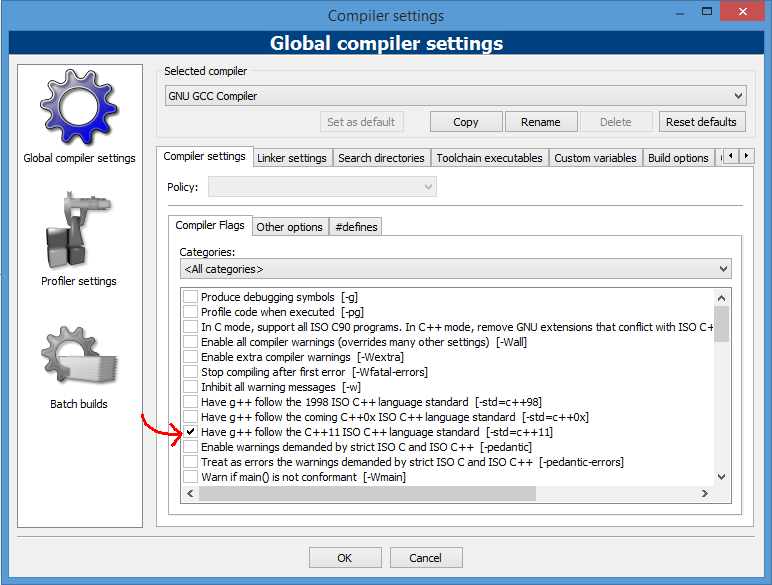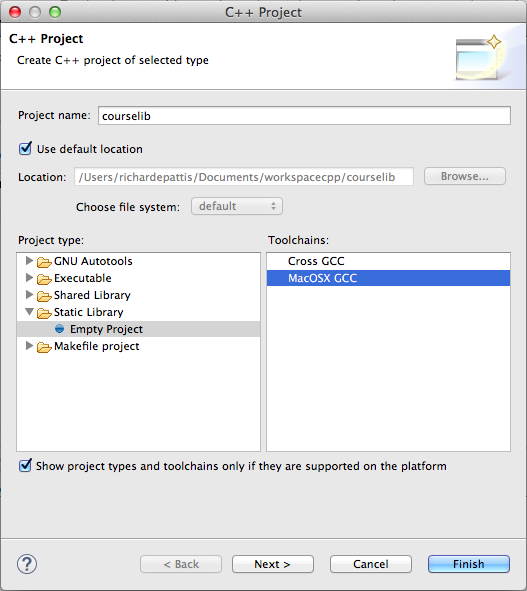In this case, 'clang' is the driver that causes the Clang compiler to expect C code and link against the C standard library. The args array specifies the command-line arguments that will be passed to clang. These arguments must be specified in the order expected by the compiler. C Library The elements of the C language library are also included as a subset of the C Standard library. These cover many aspects, from general utility functions and macros to input/output functions and dynamic memory management functions: (assert.h) C Diagnostics Library (header) (ctype.h) Character handling functions.
C Standard Library Reference.; 2 minutes to read +2; In this article. A C program can call on a large number of functions from this conforming implementation of the C Standard Library. These functions perform essential services such as input and output and provide efficient implementations of frequently used operations. May 07, 2018 Achieving conformance with the C Standards has been a long road for the Visual C team. If you’ve seen us at any conferences lately, you’ve probably seen the MSVC Conformance slide. (You can grab a copy of the slide or watch the 2017 CppCon talk here.) Finishing the features on this slide – which includes features from C11.
5 Ways to Write C Code on Your Mac. It’s hard to rank the various solutions by some standard. After you’ve read about them, it may well be that one is the obvious way to proceed initially. A, b - the values to compare ilist - initializer list with the values to compare comp - comparison function object (i.e. An object that satisfies the requirements of Compare) which returns true if a is less than b. The signature of the comparison function should be equivalent to the following. The extension uses it to infer the path to the C standard library header files. When the extension knows where to find those files, it can provide useful features like smart completions and Go to Definition navigation. The C/C extension attempts to populate compilerPath with the default compiler location based on what it finds on your.
About
makelib is a generic cross-platform makefile for building C/C++/Objective-C libraries.
Its purpose is to ease the build process of libraries for cross-platform projects.
Available targets by system
Building on OSX, the following files will be produced:

- Static library (
.a):i386x86_64armv7armv7sarm64 - Dynamic library (
.dylib):i386x86_64 - Mac framework (
.framework):i386x86_64
On Linux:
- Static library (
.a): host architecture - Dynamic library (
.so): host architecture
Note that on OS X builds, ARM libraries are obviously targeted for iOS.
Configuration
Recommended project structure
You may use makelib as a submodule of your project.
You'll need a build directory with a specific structure, a directory with sources, a directory with includes and finally a Makefile with configuration options.
Here's an example project structure:
Configuration Makefile
A makefile containing configuration values for makelib is required.
Assuming the previous project structure and a C++ project, this makefile may look like:
Please read the section below for details about each configuration value.
Configuration values
PRODUCT
The name of your product/project.
PRODUCT_LIB
The name for the generated static library.
Note: always use a lib prefix.
PRODUCT_DYLIB
The name for the generated dynamic library.
Note: always use a lib prefix.
PRODUCT_FRAMEWORK
The name for the generated Mac framework package.
PREFIX_DYLIB
The directory in which the dynamic library is intended to be installed.
PREFIX_FRAMEWORK
The directory in which the Mac framework is intended to be installed.
DIR_INC
The directory with include files.
DIR_SRC
The directory with source files.
DIR_RES
The directory with resource files, link Info.plist.
DIR_TESTS
The directory with unit test files, if any.
EXT_C
The file extension for your C source files (typically .c).
EXT_CPP
The file extension for your C++ source files (typically .cpp).
EXT_M
The file extension for your Objective-C source files (typically .m).
EXT_MM
The file extension for your Objective-C++ source files (typically .mm).

EXT_H
The file extension for your header files (.h, .hpp, etc).
FILES
The project files to compile.
Note that you can use the GET_C_FILES function for convenience:
FILES_TESTS
The unit test files to compile.Note that you can use the GET_C_FILES function for convenience:

CC
The compiler to use (clang, gcc, g++, etc).
LIBS
Any libraries to link with when building the project.
Eg: -lpthread -lz -lc++
FLAGS_OPTIM
Optimisation flags for the compiler (Os, O3, etc).
FLAGS_WARN
Warning flags for the compiler.
Eg: -Wall -Werror -Wpedantic
FLAGS_STD_C
The C language standard to use (c99, c11, etc).
FLAGS_STD_CPP
The C++ language standard to use (c++11, c++14, etc).
FLAGS_OTHER
Any other flags to pass to the compiler.
FLAGS_C
Specific flags for the C compiler.
FLAGS_CPP
Specific flags for the C++ compiler.
FLAGS_M
Specific flags for the Objective-C compiler.
FLAGS_MM
Specific flags for the Objective-C++ compiler.
BUILD_LEGACY_ARCHSBuilds legacy architectures (eg. i386 on macOS).
Note: define it before including Common.mk
C++ Std Library Source Code
Demo / Example
You'll find a working example C project in the Demo subdirectory.
License
C++ Using Namespace Std
makelib is released under the terms of the MIT license.